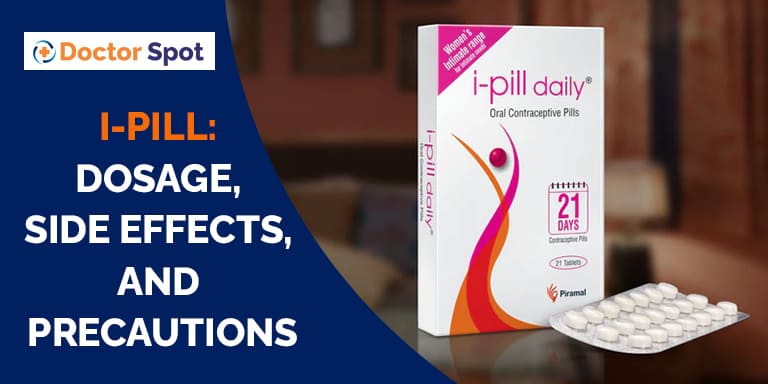I-Pill: Understanding Dosage, Side Effects, and Precautions

Have you ever found yourself grappling with the maze of misinformation surrounding emergency contraceptive pills? The I-Pill, a popular choice for many, often finds itself at the center of controversy and confusion. This article aims to shine a light on the I-Pill, providing a thorough exploration of its uses, dosage, side effects, and precautions. Let’s embark on this journey to understand more about this often misunderstood medication.
Introduction: A Pill of Controversy and Relief
In moments of unexpected intimacy, the I-Pill can seem like a beacon of hope, a solution to prevent unplanned pregnancy. But what lurks behind the simple act of taking a pill? With stories and myths swirling around, it’s crucial to separate fact from fiction to make informed decisions about our bodies and health.
What is I-pill?
Understanding the I-Pill: A Brief Overview
The I-Pill is an emergency contraceptive intended for use within 72 hours of unprotected intercourse or contraceptive failure. It contains levonorgestrel, a hormone that prevents pregnancy by delaying ovulation, blocking fertilization, or preventing a fertilized egg from implanting in the uterus.
Delving Deeper: Dosage Guidelines
The effectiveness of the I-Pill hinges on timely administration. The standard dosage is a single 1.5mg tablet taken as soon as possible after unprotected intercourse. Let’s decode the timing further:
Timing Matters
- The sooner, the better: Ideally, within 12 hours and no later than 72 hours.
- Beyond 72 hours: Its effectiveness dwindles significantly.
Side Effects: A Necessary Conversation
No medication comes without its baggage of side effects, and the I-Pill is no exception. Commonly reported symptoms include:
- Nausea or vomiting
- Fatigue
- Headache
- Dizziness
- Breast tenderness
- Changes in menstrual cycle
Mitigating the Side Effects
- Stay hydrated and rest
- Over-the-counter medication can relieve some symptoms
- Consult a healthcare provider if symptoms persist or are severe
Precautions and Warnings: Not to Be Overlooked
The I-Pill is generally safe, but it’s not suitable for everyone. Here are key considerations:
- Not a regular contraceptive: It’s for emergency use only.
- Medical history: Discuss with a healthcare provider if you have underlying health conditions.
- Drug interactions: Inform your provider about any other medications you’re taking.
Concerns About Emergency Contraceptive Pills for Adults
Emergency contraceptive pills (ECPs) are a valuable option for preventing unintended pregnancies after unprotected intercourse or contraceptive failure. While ECPs are generally safe and effective, there are some concerns and considerations that adults should be aware of:
- Effectiveness: ECPs are most effective when taken as soon as possible after unprotected sex. Delaying the intake reduces their effectiveness.
- Side Effects: Common side effects of ECPs may include nausea, vomiting, fatigue, headache, and breast tenderness. These effects are usually mild and temporary.
- Menstrual Changes: ECPs can cause menstrual irregularities, such as earlier or later periods, heavier or lighter bleeding, or spotting between periods. These changes typically resolve within a few weeks.
- Repeated Use: While ECPs are safe for occasional use, frequent or repeated use is not recommended. Regular contraception methods, such as condoms or hormonal contraceptives, are more suitable for ongoing birth control needs.
- STI Protection: ECPs do not protect against sexually transmitted infections (STIs). It’s important to use condoms consistently to reduce the risk of STIs.
- Health Conditions: Adults with certain health conditions, such as liver disease or a history of blood clots, should consult a healthcare provider before using ECPs.
- Interactions with Medications: Some medications, such as certain anticonvulsants and herbal supplements, may interact with ECPs, reducing their effectiveness. Always inform your healthcare provider about any medications you are taking.
- Efficacy: While ECPs are highly effective at preventing pregnancy, they are not 100% foolproof. In some cases, pregnancy may still occur despite taking ECPs.
It’s essential for adults considering ECPs to weigh the benefits and risks, consult a healthcare provider for guidance, and explore long-term contraceptive options for ongoing birth control needs.
Uses and Misuses: Setting the Record Straight
The primary use of the I-Pill is to prevent pregnancy after unprotected sex. However, it’s crucial to dispel some common misconceptions:
- It does not protect against STDs
- It’s not an abortion pill
Conclusion: Embracing Informed Choices
The journey through understanding the I-Pill’s landscape reveals the importance of informed choices in reproductive health. While the I-Pill offers a solution in times of need, its efficacy and side effects underscore the need for responsible use. Let’s make informed decisions based on facts, not fear, and navigate our health journey with confidence.
Takeaway Message
In the sea of information and myths surrounding emergency contraception, arming ourselves with accurate knowledge is our beacon. May we make choices that reflect our respect for our bodies and well-being.
As we conclude this exploration of the I-Pill, remember that knowledge is power, especially when it comes to our health. Choosing wisely can make all the difference in the world.